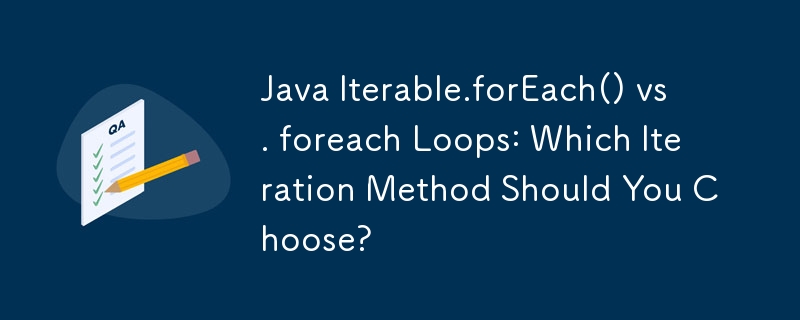Home >Java >javaTutorial >Java Iterable.forEach() vs. foreach Loops: Which Iteration Method Should You Choose?
Java Iterable.forEach() vs. foreach Loops: Which Iteration Method Should You Choose?
- DDDOriginal
- 2024-12-06 14:22:16329browse

Comparable Practices for Java's Iterable.forEach() and foreach Loops
When working with Java 8, developers may question the superiority of using Iterable.forEach() over traditional foreach loops. While both methods serve the purpose of iterating through a collection, certain aspects need to be considered to determine the better practice.
Advantages of foreach Loops
- Maintains simplicity and familiarity within the Java ecosystem.
- Allows for greater flexibility, including the use of non-final variables, handling checked exceptions, and implementing flow control with break statements.
- Provides clearer exception handling and debugging experience, as exceptions are handled within the loop's code block.
- Optimizes performance by allowing the JIT compiler to perform more efficient code transformations.
- Avoids potential issues with parallel execution, which can lead to unexpected behavior and difficult-to-trace bugs.
Shortcomings of Iterable.forEach()
- Violates the "Keep It Simple, Stupid" principle by introducing additional layers of code.
- Limits functionality due to restrictions on non-final variable usage and inability to handle checked exceptions.
- Provides limited flow-control options, lacking a direct equivalent to the break statement.
- May result in suboptimal performance due to reduced compiler optimization opportunities.
- Can execute in parallel by default, potentially leading to unpredictable outcomes.
- Makes debugging more challenging due to the nested call hierarchy and possible parallel execution.
Suitable Uses for Iterable.forEach()
Despite the limitations mentioned above, Iterable.forEach() remains useful in specific scenarios:
- Iterating through a synchronized list to maintain atomicity.
- Performing parallel execution when the problem aligns with Streams' assumptions.
- Calling a single function cleanly through method reference arguments.
Best Practice Recommendations
Based on the evaluation above, foreach loops generally offer more advantages over Iterable.forEach() for most scenarios. They provide greater flexibility, readability, and optimization potential. However, for cases involving thread synchronization, parallel execution, or specific container requirements, Iterable.forEach() may be a suitable choice.
The above is the detailed content of Java Iterable.forEach() vs. foreach Loops: Which Iteration Method Should You Choose?. For more information, please follow other related articles on the PHP Chinese website!

